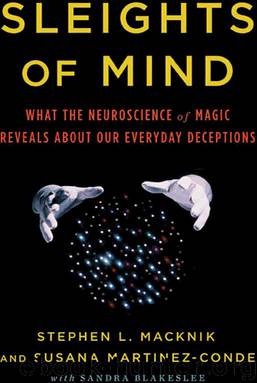Sleights of Mind by Stephen Macknik

Author:Stephen Macknik [Blakeslee, Sandra]
Language: eng
Format: epub, mobi
Publisher: Henry Holt and Co.
Published: 2010-11-09T06:00:00+00:00
END OF SPOILER ALERT
When our son Iago was two, Steve showed him a magic trick. Steve felt he had gotten pretty good at the trick and wanted to show off. But Iago was unimpressed. Here was a kid who was endlessly delighted and entertained by the fact that he could blow out a candle but found something utterly impossible to be utterly banal. You already know why. His brain was still naive enough about the laws of physics and causality that he had no predictions on which to base a sense of surprise. He was still young enough that we could show him how to make an object travel through a magic space-time wormhole and he would simply note it, and maybe play around with this new fact for a while—in exactly the same way he played around with pouring liquid from one container to another, or pulling his socks on and off, on and off—and that would be that.
Mac King agrees with us. Kids are harder to fool, he says, because they don’t have strong expectations about the world. They just think magic exists. Some people really can make a coin dematerialize. If you believe in Santa Claus, what’s not to believe in a magic show? It’s just a bunch of adults magically transporting a coin around or making cards disappear into thin air. What they really want to see is something difficult and funny, like a triple somersault resulting in the seat of the jumper’s pants splitting up the middle.
Randi agrees. Children are notoriously difficult to deceive, he says, because they’re not sophisticated enough to be fooled. They have not built up bulletproof models of probability and impossibility.
Thus we can ask: When does a child’s mind reach a level of maturity that allows her to be delighted or amazed by a magic trick? How does she acquire expectations? Indeed, what do babies know? When do they learn to predict the world? When are their expectations violable?
Such questions raise a deeper quandary. When infants are born, how much of their brains are preloaded for acquiring knowledge about the world? Are their brains blank slates, or do they possess innate structures that are locked and ready to absorb knowledge? In the 1920s, the Swiss developmental psychologist Jean Piaget pioneered this inquiry and concluded that infants younger than nine months have no innate knowledge of the world. He said they have no sense of object permanence—the idea that a thing can exist even when you don’t see it. Piaget also argued that babies gradually construct knowledge from experience, including the capacity for empathy, which he suggested came rather late in development.
Modern cognitive neuroscientists challenge many of Piaget’s conclusions and assume that infants are born with some knowledge of the physical world. They are “statistical learning machines” who have a rudimentary capacity for math and language. Young babies have everyday ideas about psychology, biology, and physics.
Because babies can’t talk, developmental psychologists have devised numerous strategies for gleaning information about infant cognition. In
Download
This site does not store any files on its server. We only index and link to content provided by other sites. Please contact the content providers to delete copyright contents if any and email us, we'll remove relevant links or contents immediately.
Periodization Training for Sports by Tudor Bompa(8273)
Why We Sleep: Unlocking the Power of Sleep and Dreams by Matthew Walker(6726)
Paper Towns by Green John(5191)
The Immortal Life of Henrietta Lacks by Rebecca Skloot(4589)
The Sports Rules Book by Human Kinetics(4388)
Dynamic Alignment Through Imagery by Eric Franklin(4217)
ACSM's Complete Guide to Fitness & Health by ACSM(4060)
Kaplan MCAT Organic Chemistry Review: Created for MCAT 2015 (Kaplan Test Prep) by Kaplan(4014)
Livewired by David Eagleman(3775)
Introduction to Kinesiology by Shirl J. Hoffman(3774)
The Death of the Heart by Elizabeth Bowen(3622)
The River of Consciousness by Oliver Sacks(3604)
Alchemy and Alchemists by C. J. S. Thompson(3522)
Bad Pharma by Ben Goldacre(3428)
Descartes' Error by Antonio Damasio(3279)
The Emperor of All Maladies: A Biography of Cancer by Siddhartha Mukherjee(3163)
The Gene: An Intimate History by Siddhartha Mukherjee(3098)
The Fate of Rome: Climate, Disease, and the End of an Empire (The Princeton History of the Ancient World) by Kyle Harper(3067)
Kaplan MCAT Behavioral Sciences Review: Created for MCAT 2015 (Kaplan Test Prep) by Kaplan(2987)
